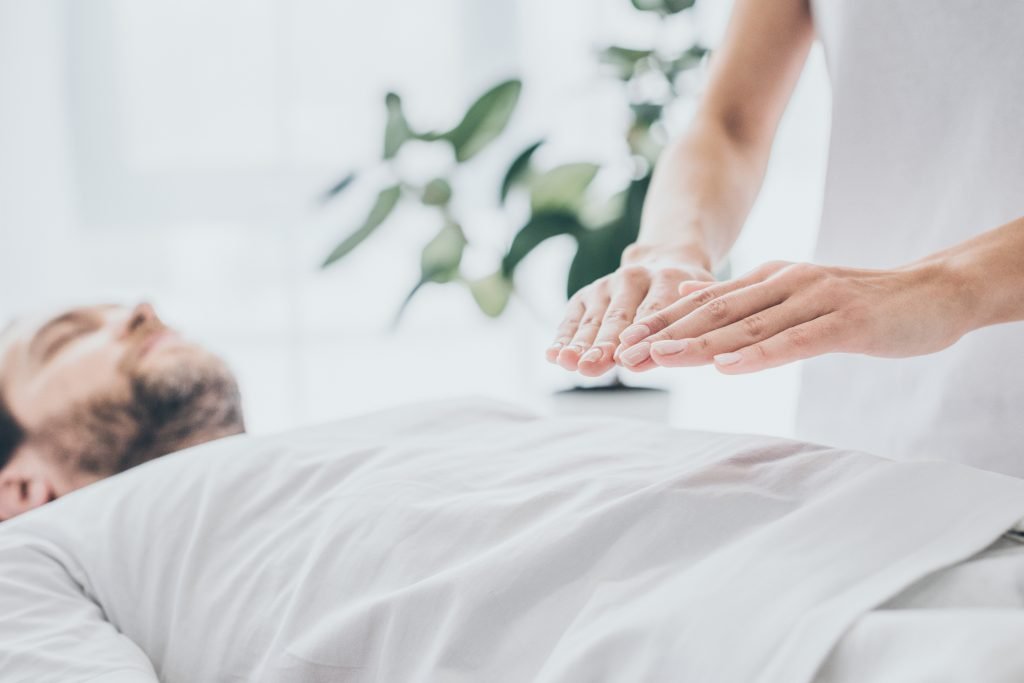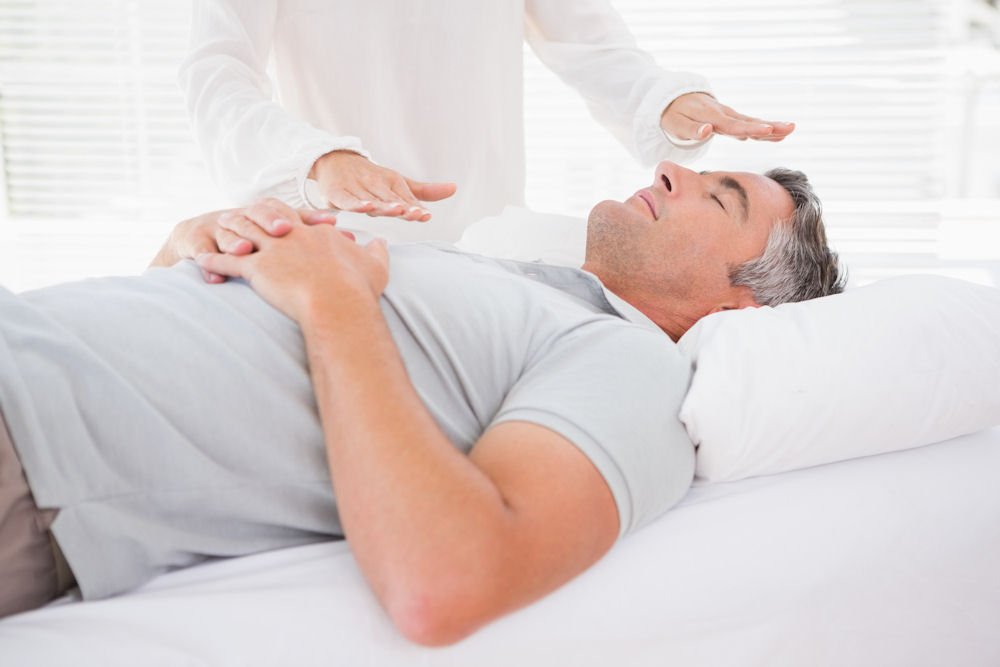Reiki is a gentle and non-invasive form of energy healing proven effective in treating addiction. In the state of California, where holistic health practices are highly valued, Reiki has emerged as a popular alternative therapy for those struggling with addiction. Whether you or a loved one are currently battling addiction, or simply seeking additional support on your journey to sobriety, Reiki may be the key to achieving balance and inner peace.
Our addiction and mental health treatment programs for men in California can help you overcome substance use disorder using holistic therapy. Don’t hesitate to get the help you deserve today!
Reiki is a form of holistic therapy that promotes healing and relaxation through the mind-body connection. It originated in Japan and is based on the belief that an unseen “life force energy” flows through all living beings, and when this energy is low, it can lead to illness or stress.
The mind-body connection is essential in Reiki as it recognizes the impact of our thoughts and emotions on our physical well-being. Reiki aims to restore balance and harmony within the individual by addressing both the mind and body, leading to a greater sense of overall well-being.
One of the key principles of Reiki for addiction treatment in Marin County is its whole-body approach to recovery. Similar to our other addiction therapy services, Reiki works to address the root cause of these issues by considering the person as a whole – physically, mentally, emotionally, and spiritually.


This is considered the traditional form of Reiki and was developed by Mikao Usui in Japan. It involves a combination of hand positions, symbols, and mantras to channel energy into the recipient's body. Usui Reiki is believed to promote relaxation, reduce stress, and enhance overall health.
Developed by William Lee Rand in the 1990s, Karuna Reiki incorporates elements from both Usui and Tibetan Reiki systems. It focuses on deep healing at a spiritual level and uses specific symbols to access higher levels of consciousness.
This relatively new form of Reiki was developed by William Lee Rand in 2014. It combines traditional Usui Reiki with a more modern approach to energy healing. Holy Fire Reiki is said to be more powerful and effective in releasing negative energies and promoting emotional healing.
Created by Hiroshi Doi in the late 1990s, Gendai Reiki integrates traditional Japanese techniques with Western principles. It emphasizes personal growth and self-healing through various meditation practices.
Developed by Ole Gabrielsen in 1991, Kundalini Reiki is based on ancient Hindu practices involving the awakening of dormant energy within an individual known as Kundalini energy. It aims to clear blockages in the chakras and restore balance to one's physical, emotional, and spiritual state.
Tibetan monks are believed to have practiced a form of energy healing long before Reiki was introduced. Tibetan Reiki incorporates elements of traditional Tibetan medicine and Buddhist practices, making it a more spiritual and meditative approach to healing.
One of the main effects of Reiki at our men’s drug and alcohol rehab is its ability to induce a state of deep relaxation. This can be attributed to its ability to reduce stress and anxiety levels, leading to an increase in parasympathetic nervous system activity. The parasympathetic nervous system is responsible for rest and digestion functions, which help promote relaxation, improve digestion, and lower blood pressure.
In addition to inducing relaxation, Reiki has also been found to activate certain regions of the brain associated with pain processing. Studies have shown that Reiki can significantly reduce pain levels in individuals suffering from chronic conditions such as fibromyalgia and cancer. This may be due to its ability to increase endorphin levels in the body, which are natural painkillers.
Furthermore, Reiki’s effect on the body extends beyond just reducing pain. It has also been found to boost immune function by increasing white blood cell counts and enhancing their activity. This can help improve overall health and prevent illness.
Another potential effect of Reiki on the brain is its ability to improve emotional well-being. By promoting relaxation and reducing stress levels, it can help alleviate symptoms of depression, anxiety, and other mood disorders. Some studies have also shown that Reiki can improve self-esteem and decrease feelings of anger or aggression.
While more research is needed to fully understand Reiki’s effect on the brain and body, existing evidence suggests that it can have significant benefits for both physical and mental health. Its ability to induce relaxation, reduce pain, boost immune function, and improve emotional well-being makes it a promising complementary therapy for individuals seeking a holistic approach to wellness.
One of the primary benefits of Reiki for addiction at our holistic rehab center in California is its ability to reduce stress and promote deep relaxation. The gentle touch and soothing energy transferred during a session can help calm the mind, release tension in the body, and improve overall mood. This can be especially beneficial for individuals dealing with chronic stress or anxiety.
Reiki has been shown to strengthen the immune system by promoting balance and harmony within the body. By addressing imbalances in the body's energy flow, Reiki can help boost the body's natural healing abilities and increase resistance to illness.
Many individuals turn to Reiki for pain relief, whether it be physical or emotional pain. The calming effect of Reiki can help alleviate discomfort by reducing tension in muscles, promoting relaxation, and releasing blocked energy.
Along with physical benefits, Reiki can also have a positive impact on one's emotional well-being. By bringing balance to emotions and releasing negative energy, Reiki can help individuals let go of past traumas or emotional blockages.
Due to its relaxing nature, Reiki can also improve sleep quality for those struggling with insomnia or other sleep disorders. By promoting deep relaxation and reducing stress levels, Reiki can help individuals achieve a more restful night's sleep.
While not meant to replace traditional medical treatment, Reiki for addiction can be used alongside long-term rehabilitation as a complementary therapy. It has been shown to reduce side effects from medication or medical procedures and improve overall well-being.
Addiction is a complex disease that affects not only the physical body but also the mind and spirit. Receiving reiki treatments can help individuals struggling with addiction to achieve balance and harmony within all aspects of their being.
One of the main benefits of reiki for addiction recovery in Marin County is its ability to reduce stress and anxiety. Many addicts turn to substances as a coping mechanism for dealing with life’s challenges and negative emotions. Through reiki for addiction, patients can experience deep relaxation and a sense of calmness, making it easier for them to resist cravings and maintain sobriety.
Moreover, reiki for addiction helps release blocked energies within the body that may be contributing to addictive behaviors. By balancing these energies, it can improve overall well-being and increase self-awareness. This heightened awareness can aid individuals in identifying triggers and addressing underlying issues that may have led them down the path of addiction.
In addition, reiki sessions often involve setting intentions or goals for healing. This process can help recovering addicts stay focused on their recovery journey and cultivate a positive mindset towards achieving their goals.
Reiki for addiction has also been shown to enhance feelings of self-worth and promote self-love. Individuals struggling with addiction may have low self-esteem due to guilt or shame surrounding their actions while under the influence. Receiving regular reiki treatments can help them reconnect with themselves on a deeper level and learn to love themselves unconditionally.
Lastly, many recovering addicts report an increased sense of spirituality after incorporating reiki into their treatment plan. This spiritual aspect allows individuals to find meaning and purpose outside of substance abuse, helping them build a fulfilling life in sobriety.
Our dual diagnosis treatment center in California treats co-occurring addiction and mental illness. This means that a person is struggling with both substance abuse and a mental health disorder at the same time. It is important to understand this concept before exploring Reiki for recovery, as it can help you better address both issues simultaneously.
Before starting any new treatment approach, it is essential to consult with a mental health professional who specializes in dual diagnosis. They can assess your individual needs and guide whether Reiki may be beneficial for your recovery journey.
Reiki should not be seen as a standalone treatment for dual diagnosis, but rather as an adjunct therapy that can complement other forms of treatment such as our partial hospitalization program (PHP), therapy, and support groups. Talk to your mental health professional about incorporating Reiki into your overall treatment plan.
When seeking Reiki for addiction recovery, it is crucial to find a qualified practitioner who has experience working with individuals in recovery from addiction and mental illness. They should also have proper certification and training in Reiki techniques.
Reiki for addiction may not be effective for everyone, and it may take some time before you notice any changes or improvements in your symptoms. It is essential to approach this practice with an open mind and have realistic expectations.
Golden Gate Recovery offers a unique approach to breaking the cycle of addiction through the use of Reiki. Addiction takes a toll on all aspects of a person’s being, causing imbalances and disharmony. Through Reiki, these imbalances can be addressed and corrected, promoting healing and self-awareness. This is crucial in breaking the cycle of addiction as it helps individuals understand the root causes of their addictive behaviors.
If you or someone you know is struggling with addiction, contact us to learn more about our holistic approach that includes Reiki therapy. Together, we can break the cycle of addiction and promote healing for a better future.

Golden Gate Recovery is a grass roots organization created by men in long term recovery with a simple mission: to continue strengthening our therapeutic and peer led community toward the goal of long term recovery for each client.